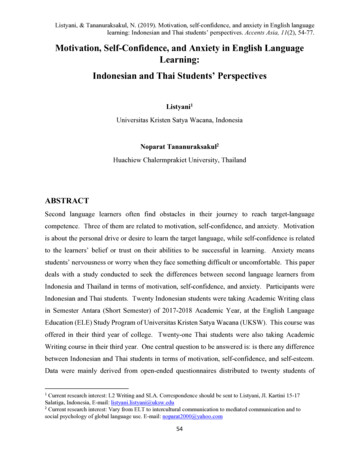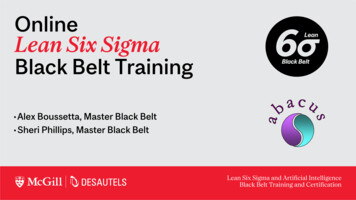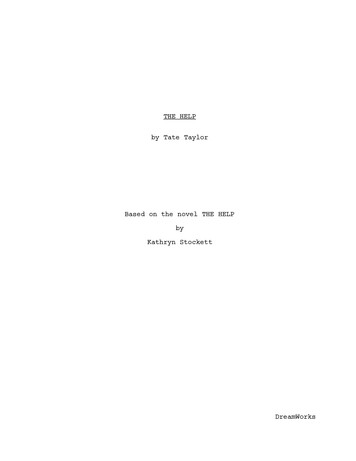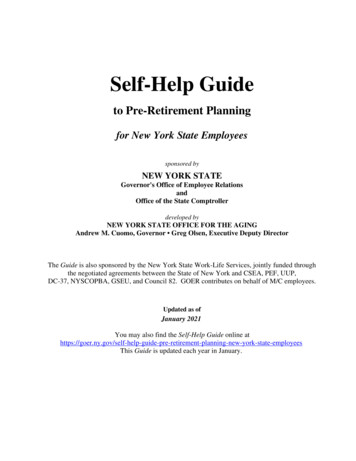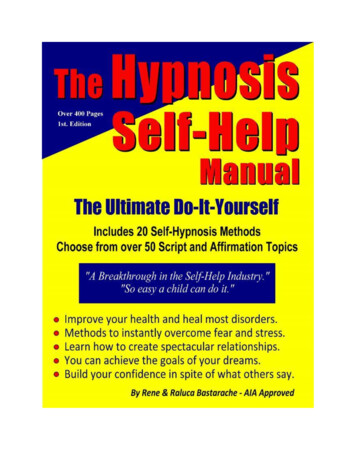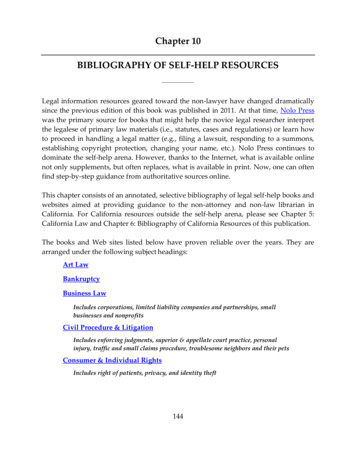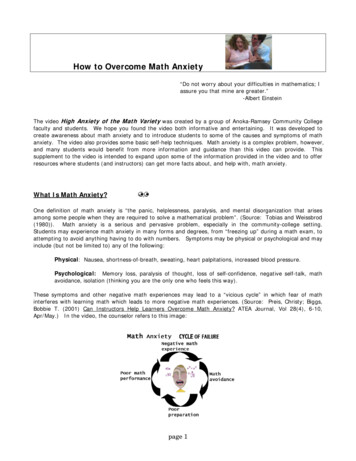
Transcription
Self Help for Anxiety Do you find that you spend large periods of the day worrying?Do you often feel nervous, apprehensive or on edge?Do you feel that things are getting on top of you?Do you find it hard to relax and 'switch off'?Do you often experience unpleasant physical sensations such as 'butterflies' in yourstomach, muscular tension, dizziness or breathlessness?If the answer to any of these questions is 'yes', you may be experiencing symptoms ofanxiety and you may find this workbook helpful.This workbook aims to help you to: Recognise whether you may be experiencing symptoms of anxiety.Understand what anxiety is, what causes it and what keeps it going.Find ways to understand, manage or overcome your anxiety.
Do I have symptoms of anxiety?If you experience symptoms of anxiety it is likely that you will recognise many of the feelings,physical symptoms, thoughts and behaviour patterns described below.Please tick the boxes which regularly apply to you.FeelingsOn edgeNervousPanickyStressedIrritable/low patience thresholdUptightPhysical SymptomsTense body/Muscular painDizzy/FaintChest tight or painfulStomach ChurningTrembling or tingling sensationsHeart racing/palpitationsBreathing faster or slower than usualConcentration difficultiesThinking stylesYou often worry 'what if' something bad happensYour mind jumps from worry to worryYou often imagine the worst case scenariosYou are always on the look out for dangerBehaviour PatternsAvoid doing things you would like toPace around/Find it hard to relaxSnap at people too easilyGet easily flusteredTalk very quicklyIf you have ticked a number of these boxes you may be experiencing symptoms of anxiety.However don't be alarmed, this is very common and there are things you can do to improveyour situation. You will find some useful strategies in this workbook.
What is anxiety?Anxiety is an unpleasant feeling that we all experience at times. It is a word often used todescribe when we feel 'uptight', 'irritable', 'nervous', 'tense', or 'wound up'. When we are anxiouswe normally experience a variety of uncomfortable physical sensations. These include: Increased heart rateMuscular tensionSweatingTremblingFeelings of breathlessnessAs well as this, anxiety affects us mentally too. For example, when anxious, we often worry forlarge periods of time, so much so that our worry can feel out of control. These worries are oftenabout a variety of issues and commonly our mind jumps quickly from one worry to another.Anxiety also influences how we behave. For instance, when we feel anxious, we often avoiddoing things that we want to because we are worried about how they will turn out. Althoughshort experiences of anxiety are part and parcel of daily life, it becomes challenging whenanxiety begins to follow people around and is a regular feature in their lives.
What causes anxiety?Life Events:Often we develop anxiety following a series of stressful lifeevents. This is especially true if we experience many differentpressures all at once. For example, if someone has workpressures, financial difficulties, and relationship problems, all atthe same time, it is perhaps unsurprising that they becomeanxious. When thinking about it in this way, anxiety is often theresult of feeling as though we cannot cope with the demandsplaced upon us.In addition, people can learn to be anxious based on their lifeexperiences. For example, if someone has faced workplacebullying in the past, they may be more likely to suffer anxiety whenbeginning a new job.Thinking Styles:Some people may have a thinking style that lendsitself to experiencing anxiety. For example, anxiouspeople have a tendency to expect that the worstpossible scenario will always occur. They also feellike they must constantly be on guard in casesomething bad happens. They believe that by thinkingabout all the things that could go wrong, they will be betterprepared to cope if it happens. However thinking in theseways mean they are on regular alert and find it difficult torelax and 'switch off'.Evolutionary Reasons:We also experience anxiety because of its evolutionarybenefits. Put another way, although anxiety is largely anunpleasant experience, it also has positive benefits thathave been useful to humans over the centuries. Forexample, when we are under threat or feel in danger (e.g.hear a burglar), we automatically become anxious. As aresult, our heart beats more quickly which supplies blood toour muscles (which helps us run away from or fight theburglar); we sweat (which cools us down during thisprocess); and our breathing changes (which ensuresoxygen is delivered to our muscles quickly, again preparingus for a quick response). When looking at anxiety in thisway, you can quickly see how it can be very useful incertain situations.Biological Reasons:It has also been suggested that anxiety has familialties. In other words, if someone in your immediatefamily is an anxious person, there is an increasedchance that you will have similar personality traits.In reality it is likely that a combination of all these factors influence someone's anxiety levels.However, in some ways it is less important to know what causes anxiety, and more important toknow what stops us overcoming it.
What keeps our anxiety going?Some people have a style of thinking which lends itself to experiencing anxiety. For example, itappears that some people are more likely to overestimate the likelihood of bad thingshappening than others. It is easy to see how regularly presuming the worst in this way wouldmake someone feel anxious. Unfortunately, when we do feel anxious, we become even lesslikely to think as clearly as we would like and a vicious cycle occurs.Anxious people also sometimes believe that worrying has a protective function. Morespecifically, they believe that being on the 'look out' for danger can help them to recognise andavoid it. Unfortunately, when searching for danger in this way, they soon begin seeing potentialdanger in many relatively safe situations which of course makes them feel anxious. They mayalso believe that by considering everything that could go wrong; they will be better prepared tocope when it does. However, often these beliefs mean a lot of extra time is spent worrying thanis necessary, as many of our worries never come true. Of course, the more time we spendworrying, the more anxious we feel.Another way someone's thinking style can keep their anxiety going is because they become'worried about worrying'. Here, people tend to worry that they are doing harm to themselves(e.g. going mad) by worrying so often (which is not the case) and a vicious cycle occurs.Similarly, people often worry about the physical symptoms they experience when they areanxious (e.g. breathlessness, rapid heart rate etc). Unfortunately, worrying about thesesymptoms (which are perfectly safe and natural bodily reactions), only makes them feel worse,again creating a vicious cycle of anxiety.One other important factor that can keep people's anxiety going is that they often change theirbehaviour as a result of their anxiety. For example, they may avoid going to a party becausethey have spotted many potential 'dangers' (e.g. “what if no one likes me”). Similarly, they mayput off completing an assignment because they worry about it being negatively evaluated.Unfortunately because people tend to use such avoidance strategies, they can never see thatthings would often go better than they thought and their anxiety remains as a result.Not having enough free time to relax and do the things we enjoy we can also contribute to ourhigher anxiety levels. On the other hand, having too much free time can mean we have lots ofopportunities to engage in worry and feel anxious.When looking more closely at anxiety, you can begin to see that our thoughts, feelings,behaviours and physical symptoms all interact and combine to keep our anxiety going. See thediagram overleaf.
How can I reduce my anxiety?Fortunately, there are a number of strategies that we can use to reduce our anxiety. Theseinclude:1. Understanding more about anxiety.2. Learning how to challenge your unhelpful thoughts and see things in a more realisticlight.3. Improving your problem solving skills.4. Learning how to reduce the amount of time you spend worrying.5. Learning how you can feel more relaxed (physically and mentally).6. Learning how to stop avoiding the things that make you anxious.When going through this booklet it can sometimes be more helpful to try out the ideas aboveone at a time, rather and trying to learn them all at once. However simply take things at yourown pace.
Understanding anxietyAnxiety is undoubtedly an unpleasant feeling, but it is something that everyone experiences. Ofcourse, some people experience anxiety more regularly than others, but it is a completelynatural experience that is part and parcel of daily life. Due to the unpleasant nature of anxiety,people often worry that experiencing it is harmful. For example they may fear that regularlyworrying will make them go mad or that the physical symptoms of anxiety (e.g. heart racing) aresigns of a serious health problem. Such fears naturally make people even more anxious whichcreates a vicious cycle of anxiety.However, when exploring anxiety more closely, we can see that it is a very healthy responsewhich actually helps to protect us. By learning more about anxiety and why we experience it inthe first place, we can see that it is not harmful. This can help us to be less fearful of thesymptoms which in turn has a positive affect on our overall anxiety levels. If however you areconcerned that some of your symptoms are not caused by anxiety, contact your GP ifnecessary.The symptoms we experience when anxious are often referred to as the 'fight or flight'response. This comes from the idea that people primarily experience anxiety to help them eitherfight or run away from danger. For example, if you saw a burglar, two options open to you wouldbe to either - fight them off (fight) or try to run away (flight). Our fight or flight response wouldkick in to help us at this point. For example: Our hearts would begin beating more quickly(supplying blood to our muscles).We would sweat (to cool us down).Our muscles would become tense (ready for action).We would take deeper breaths (to supply oxygen toour muscles).In essence, all of these responses would aid our escape orimprove our ability to stay and fight the intruder. Whenconsidered in this way, we can see how the symptoms ofanxiety are helpful to us. Indeed, all of the physicalsymptoms we experience when anxious play a helpful rolein protecting us in such circumstances.This fight or flight response was likely even more vital tohuman survival back in the days of early man, when people had to hunt for their food and wereunder a greater threat from predators. Nowadays we do not face the same threats, butunfortunately, our bodies and minds have not caught up with these changes. As a result, wenow experience anxiety in situations where it is not necessarily as helpful because we cannotfight or run away from them (e.g. work or financial pressures). However, the one thing that hasstayed true is the fact that these symptoms are not dangerous; it is in many ways the rightresponse but at the wrong time. Remembering this can help you to be less fearful of thesymptoms of anxiety which will allow them to pass sooner.
Challenging unhelpful thoughtsThe way that we think about things has an impact on our anxiety levels. Many of these thoughtsoccur outside of our control, and can be negative or unhelpful. It is therefore important toremember that they are just thoughts, without any real basis, and are not necessarily facts.Even though we may believe a lot of our unhelpful thoughts when we are anxious, it is good toremember that they should be questioned as they are often based on wrong assumptions.The following section will help you begin to recognise if you are thinking about things in anunhelpful or unrealistic way, and discuss how you can start to make changes to this. By doingso, you can learn to see things in a more realistic light which can help to reduce your anxietylevels. You might have unhelpful thoughts about all kinds of things. Here are some examples:Being judged negatively by others: They think I'm uselessThey won't like meBeing unable to cope: I'll make a fool of myselfI'm too anxious to manage thatI'll have a panic attackSomething terrible happening: What if I have an accident?What if I lose my job?It is clear to see how this kind of thinking mightmake us anxious. Do you ever think in any of theways outlined above?Fill in your examples below:You might find it difficult to identify an unhelpful thought. Try thinking about a time when youwere feeling anxious. Consider what was running through your mind at that time.
Patterns of unhelpful thinkingFirst you need to be able to recognise an unhelpful thought. Then you can challenge it.Being aware of the common patterns that unhelpful thoughts follow can help you torecognise when you have them. Here are some of the common patterns that ourunhelpful thoughts follow:Predicting the Future:When we are feeling anxious, it is common for us to spenda lot of time thinking about the future and predicting whatcould go wrong, rather than just letting things be. In theend most of our predictions don't happen and we havewasted time and energy being worried and upset aboutthem.For example: Assuming you will perform poorly at your job interview. Spending the week before an exam predicting you willfail, despite all your hard work studying and yourprevious good grades.Mind Reading:This means that you make assumptions about others'beliefs without having any real evidence to support them.For example: My boss thinks I'm stupid. People think I'm weird.Such ways of thinking naturally make us apprehensive.Catastrophising:People commonly 'catastrophise' when they
Self Help for Anxiety Do you find that you spend large periods of the day worrying? Do you often feel nervous, apprehensive or on edge? Do you feel that things are getting on top of you? Do you find it hard to relax and 'switch off'? Do you often experience unpleasant File Size: 593KBPage Count: 28
